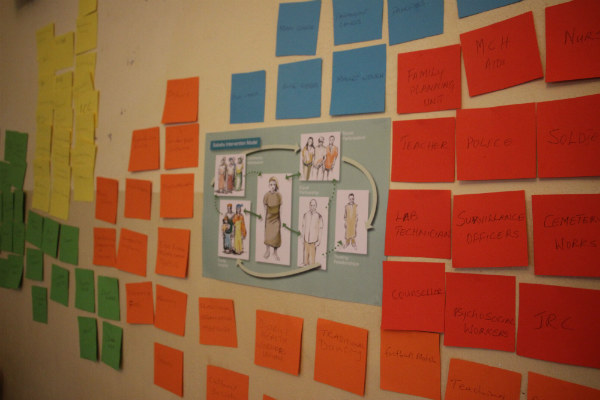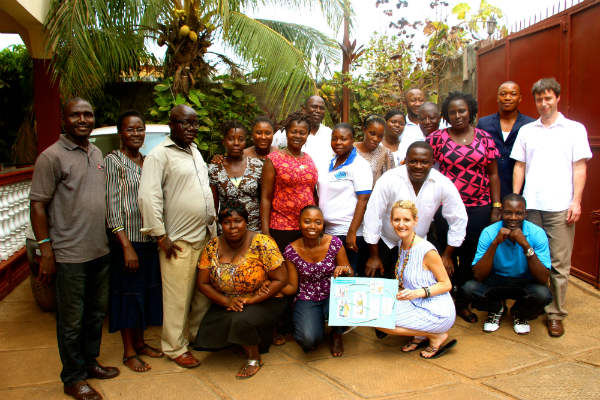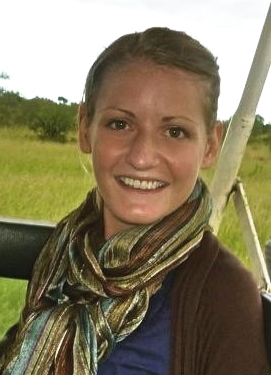 Meredith Newlin, Research Fellow at the Social Care Workforce Research Unit in the Policy Institute at King’s, reports from Sierra Leone. Her post incorporates photographs of the Sababu Training Programme in action last month. (1,386 words)
Meredith Newlin, Research Fellow at the Social Care Workforce Research Unit in the Policy Institute at King’s, reports from Sierra Leone. Her post incorporates photographs of the Sababu Training Programme in action last month. (1,386 words)
The Ebola outbreak, which reached Sierra Leone in May 2014, quickly became a global health crisis and caused significant psychosocial distress and a disintegration of communities across West Africa. The case numbers are now dropping and Sierra Leoneans talk about the ‘aftermath’ and a shift towards a recovery phase. However, amid a resource-limited system there is still an urgent call to address the psychosocial needs of individuals and families by enhancing the skills and capacity of the existing workforce.
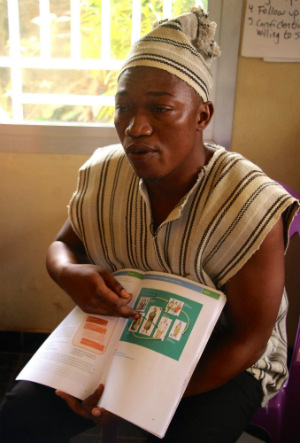 Our research in Sierra Leone began in 2012 with a feasibility study and development of a culturally sensitive social intervention to mobilise community resources and connect individuals needing care to supportive networks. In light of the Ebola outbreak, we changed parts of the intervention to address communities’ changing needs. Funded by the Maudsley Charity, Martin Webber, Director of the International Centre for Mental Health Social Research (ICMHSR), University of York, and I travelled to Freetown in April to pilot the intervention and determine its application and effectiveness during a humanitarian crisis.
Our research in Sierra Leone began in 2012 with a feasibility study and development of a culturally sensitive social intervention to mobilise community resources and connect individuals needing care to supportive networks. In light of the Ebola outbreak, we changed parts of the intervention to address communities’ changing needs. Funded by the Maudsley Charity, Martin Webber, Director of the International Centre for Mental Health Social Research (ICMHSR), University of York, and I travelled to Freetown in April to pilot the intervention and determine its application and effectiveness during a humanitarian crisis.
The Sababu Training Programme offers techniques for training mental health workers within a social intervention framework. In Krio, the local language, ‘sababu’ means connections with other people, in particular, benefiting from connections with other people. Suggested as a suitable name for the training programme by members of Sierra Leone’s Mental Health Coalition and one of our partners, sababu relates to the notion of social capital, describing the connections among people and the shared value that arises from such relationships.
Over the week our group dynamic shifted. Using Tuckman’s theory we could see how each stage was experienced: forming, storming, norming, and performing. The week was not without challenges, but each day we left feeling more energised and connected than the previous day. We were working with a group of 20 nurses that has been working together for several years. Though now placed in each of Sierra Leone’s 14 districts to lead mental health services across the country, they come together quarterly for supervision and possess a wide variety of experience. Coming in as outside trainers meant that we needed to learn the group dynamic and assert our place with it.
In Sierra Leone there is a culture around receiving health care that is most often viewed in terms of tangible items. Mental health practitioners experience this as a barrier to their credibility in the community because most Sierra Leoneans are accustomed to getting ill with a short-term disease—with malaria, for example—going to hospital and receiving a tablet or treatment with an immediate cure. Mental health problems, contrastingly, often last longer and only infrequently are they treated with medication as supply is drastically limited. The nurses are up against this challenge in their day-to-day practice.
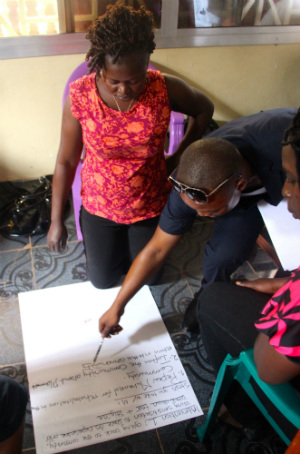 We observed during the week how the idea of tangible incentives carries over into learning and what the nurses expect to obtain from training. Questions arose about what the incentive of our training would be when knowledge was not immediately seen as a ‘take-away’. International aid organisations have plagued the training culture with financial incentives for local workers to take part in training courses, such incentives then take precedence over knowledge gained. It took us time to develop mutual understanding around the purpose of the Sababu training and how it could be seen as an opportunity to enhance practice, to better support the work they’re doing.
We observed during the week how the idea of tangible incentives carries over into learning and what the nurses expect to obtain from training. Questions arose about what the incentive of our training would be when knowledge was not immediately seen as a ‘take-away’. International aid organisations have plagued the training culture with financial incentives for local workers to take part in training courses, such incentives then take precedence over knowledge gained. It took us time to develop mutual understanding around the purpose of the Sababu training and how it could be seen as an opportunity to enhance practice, to better support the work they’re doing.
In many of the UK training events Martin and I have held together we use a great deal of experiential learning, sharing difficult cases and success stories to relate the model to practice, building upon that knowledge from peers. But what we encountered in Sierra Leone is that the nurses didn’t feel there was learning happening if it came from peers and their own experience: they wanted to see what knowledge and expertise we as trainers could impart to them.
Like many African cultures, Sierra Leone teaching is often characterised as using a didactic style. The teacher or trainer is seen as an authority figure with expertise to pass down to participants who listen and observe (typically in lecture format, PowerPoint preferred). Coming to training, the nurses expected new knowledge to be given and that they could sit as passive recipients. Which, unfortunately, translates to the need for ‘no sleeping’ to be listed in ground rules!
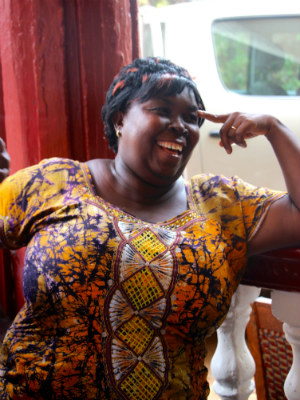 Although it wasn’t immediately welcomed, our style of interactive training, with a great deal of practice through role plays and encouraging the quiet nurses to be actively involved, was eventually appreciated by most members of the group. Understanding their preconceptions of what training should look like, we didn’t need to drastically change our plans but we found activities that would meet their needs whilst offering dynamic interaction. It did also help us to think critically about the pitch. We needed to ensure the nurses would walk away with specific strategies and tools to use in their practice so they felt they had learned something.
Although it wasn’t immediately welcomed, our style of interactive training, with a great deal of practice through role plays and encouraging the quiet nurses to be actively involved, was eventually appreciated by most members of the group. Understanding their preconceptions of what training should look like, we didn’t need to drastically change our plans but we found activities that would meet their needs whilst offering dynamic interaction. It did also help us to think critically about the pitch. We needed to ensure the nurses would walk away with specific strategies and tools to use in their practice so they felt they had learned something.
During introductions one day, most described themselves first and foremost as caregivers, thinking often of how to support others but very little about how to address their own problems. Reflective practice was a new concept to them and we found it was necessary to provide a step-by-step process in how to analyse their own problems, reflect on what they could have done better in their past experiences, and begin to apply such learning to new situations.
We also spent a full day on social network mapping, first getting the nurses to write down their own networks and support systems. When it came time to practise using this approach with service users, it was clear that writing is not always possible—stationery may be unavailable, service users may not be able to read and write—and thus an approach o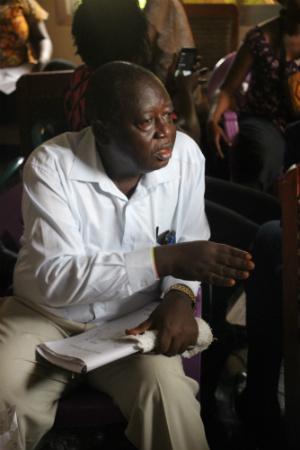 f using one’s hand to discuss social networks was deemed more appropriate. We asked them to list five supportive figures, one on each finger, on the palm to imagine enjoyable activities and the wrist as a place to imagine a comforting proverb. We then needed to break down the specific questions they could ask a service user to elicit information about their assets and resources to access in the community. By repeating these questions in role play we hope the nurses turn this new approach into tacit knowledge and make changes to their usual practice.
f using one’s hand to discuss social networks was deemed more appropriate. We asked them to list five supportive figures, one on each finger, on the palm to imagine enjoyable activities and the wrist as a place to imagine a comforting proverb. We then needed to break down the specific questions they could ask a service user to elicit information about their assets and resources to access in the community. By repeating these questions in role play we hope the nurses turn this new approach into tacit knowledge and make changes to their usual practice.
I noticed a pattern in each role play, it would start with the family member discussing why they had brought their son or daughter to see the nurse, the nurse addressing the family member first, sometimes speaking as if the person with the mental health problems wasn’t even present, and only after the family member had shared their story would the nurse turn to the individual with problems or distress. I could see that part of this approach was to show respect to an elder, but on the other hand it undermined the individual concerned and inhibited trust building.
One of our local trainers, George, paused the role play to put a rule in place: speak only to the family if your relationship with the service user has broken down. We could see this was a major shift for some nurses. Changing the way they’ve always practised is not an easy shift. But this is why role play seemed to be one of the best training methods we used—it’s necessary for them to practise the concepts we were teaching. And in a storytelling culture they are all brilliant actors, usually keen to be the difficult or unresponsive service user or the loud angry parent!
On the final day of training the nurses were asked to complete evaluation forms to assess their reaction and satisfaction with the training, the extent to which their knowledge has been enhanced, and to gain feedback about how to improve the training in future iterations. I plan to return to Sierra Leone in July and October to evaluate the extent to which the nurses have been able to put this new knowledge into practice. At that time we will also offer refresher training sessions and create videos to be used in teaching this approach of social intervention development to social work students and practitioners, funded by the University of York’s Teaching and Learning Rapid Response Fund.
Meredith Newlin is Research Fellow at the Social Care Workforce Research Unit in the Policy Institute at King’s and Research Fellow at the Department of Social Policy and Social Work at the University of York. Follow @MLnewlin
Project page for this study at the Social Care Workforce Research Unit at King’s College London
Follow @scwru
